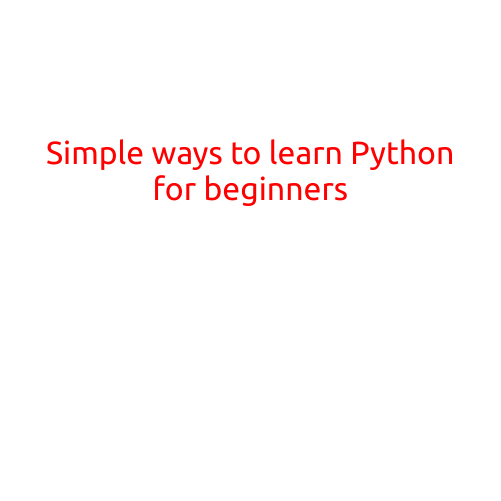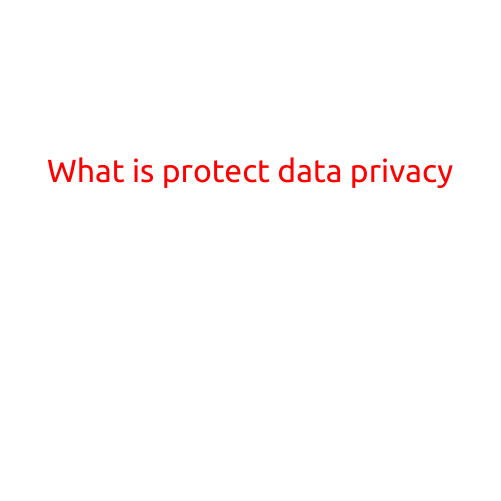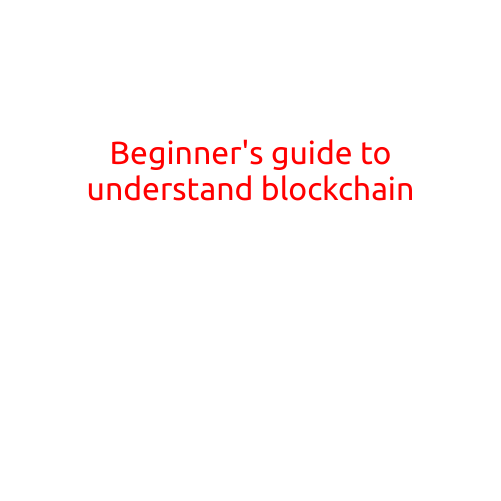
Simple Ways to Learn Python for Beginners
Are you new to the world of programming and looking to learn Python? Or maybe you’re already familiar with other programming languages and want to add Python to your toolkit? Whatever your motivation, learning Python can be a valuable skill to add to your repertoire, with applications in web development, data analysis, artificial intelligence, and more.
In this article, we’ll explore the simple ways to learn Python for beginners, making the learning process fun and accessible.
1. Start with the Basics
Before diving into advanced topics, it’s essential to understand the basics of Python. Begin with the official Python documentation, which provides an excellent introduction to the language. You can also explore online resources like Python Tutorial for Beginners on Real Python or Codecademy’s Python Course.
2. Choose a Resource
With so many resources available online, it can be overwhelming to decide where to start. Here are a few recommendations:
* **Codecademy's Python Course**: A popular online platform that offers a comprehensive introduction to Python, with interactive exercises and quizzes.
* **Python.org**: The official Python website provides extensive documentation, tutorials, and resources for beginners.
* **Udemy's Python Course**: A structured course that covers Python fundamentals, data structures, and file input/output.
3. Practice, Practice, Practice
The best way to learn Python is by writing code. Start with simple programs, such as calculators or games, to get a feel for the language. You can also try solving problems on platforms like:
* **LeetCode**: A popular platform for solving algorithms and data structure problems.
* **Project Euler**: A series of mathematical and computational programming challenges.
4. Join a Community
Learning a programming language can be more enjoyable and productive when you’re part of a community. Join online forums like:
* **Reddit's r/learnpython**: A community dedicated to helping beginners learn Python.
* **Stack Overflow**: A Q&A platform for programmers, including Python enthusiasts.
5. Use Interactive Tools
Interactive tools can make learning Python more engaging and fun. Try:
* **IPython**: An interactive shell for Python that allows you to experiment with code.
* **Repl.it**: A platform that allows you to write and run Python code in the cloud.
6. Take Online Courses
In addition to Codecademy and Udemy, other online courses worth exploring include:
* **Python for Everybody** (Coursera): A series of courses on Python programming by Dr. Charles Severance.
* **Python Programming** (edX): A course on Python programming fundamentals by the University of Michigan.
7. Read Books
If you prefer learning through books, here are some excellent resources:
* **"Python Crash Course" by Eric Matthes**: A comprehensive guide to Python programming, covering the language fundamentals and more.
* **"Automate the Boring Stuff with Python" by Al Sweigart**: A practical book that shows you how to automate tasks using Python.
8. Work on Projects
As you progress in your learning journey, focus on building projects that challenge you. This will help you retain information better and develop a sense of accomplishment. Some project ideas for beginners include:
* **To-do list app**: Build a simple to-do list app that allows users to add, remove, and mark tasks as completed.
* **Game**: Create a simple game like Tic-Tac-Toe or Snake using Python.
By following these simple ways to learn Python for beginners, you’ll be well on your way to becoming proficient in this versatile and powerful programming language. Remember to stay patient, persistent, and have fun – and you’ll soon be creating your own Python projects!





